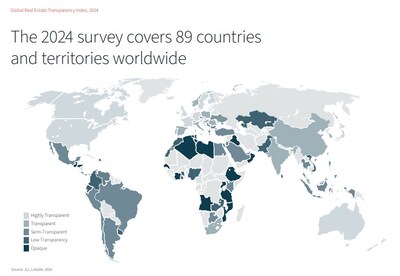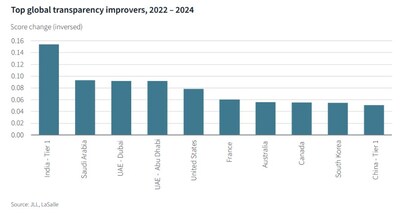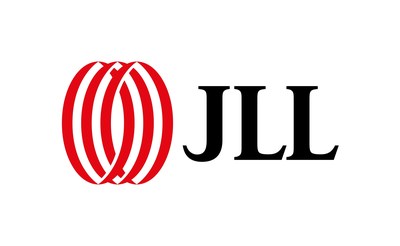Highly transparent real estate markets make strong progress, outpacing peers
JLL and LaSalle's 2024 Global Real Estate Transparency Index (GRETI) reveals that highly transparent real estate markets are making strong progress, outpacing peers. Key findings include:
1. Europe remains the most transparent region, with the U.S., Canada, France, and Australia among top improvers.
2. Singapore enters the 'Highly Transparent' group for the first time.
3. Asia records the strongest average transparency improvements since 2022, with India as the top global improver.
4. AI and sustainability are driving new transparency opportunities and challenges.
5. The top transparent countries have attracted over $1.2 trillion in direct commercial real estate investment over the last two years.
6. Debt markets, money laundering, and beneficial ownership emerge as key transparency themes to watch.
Il 2024 Global Real Estate Transparency Index (GRETI) di JLL e LaSalle rivela che i mercati immobiliari altamente trasparenti stanno facendo progressi significativi, superando i concorrenti. Le principali scoperte includono:
1. L'Europa rimane la regione più trasparente, con gli Stati Uniti, il Canada, la Francia e l'Australia tra i principali miglioratori.
2. Singapore entra per la prima volta nel gruppo dei 'Fortemente Trasparenti'.
3. L'Asia registra i più forti miglioramenti nella trasparenza media dal 2022, con l'India come migliore miglioratrice a livello globale.
4. L'IA e la sostenibilità stanno guidando nuove opportunità e sfide in termini di trasparenza.
5. I paesi più trasparenti hanno attratto oltre 1,2 trilioni di dollari in investimenti diretti nel commercio immobiliare negli ultimi due anni.
6. I mercati del debito, il riciclaggio di denaro e la proprietà benefica emergono come temi chiave di trasparenza da monitorare.
El Índice de Transparencia Global del Mercado Inmobiliario 2024 (GRETI) de JLL y LaSalle revela que los mercados inmobiliarios altamente transparentes están logrando un fuerte progreso, superando a sus pares. Los hallazgos clave incluyen:
1. Europa sigue siendo la región más transparente, con EE. UU., Canadá, Francia y Australia entre los principales mejoradores.
2. Singapur entra por primera vez en el grupo de 'Altamente Transparente'.
3. Asia registra las mayores mejoras promedio en transparencia desde 2022, siendo India el principal mejorador a nivel global.
4. La IA y la sostenibilidad están impulsando nuevas oportunidades y desafíos de transparencia.
5. Los países más transparentes han atraído más de 1,2 billones de dólares en inversión directa en bienes raíces comerciales en los últimos dos años.
6. Los mercados de deuda, el lavado de dinero y la propiedad benéfica emergen como temas clave de transparencia a seguir.
JLL과 LaSalle의 2024 글로벌 부동산 투명성 지수(GRETI)에 따르면, 고도로 투명한 부동산 시장이 강력한 진전을 이루고 있으며 동종 업계보다 앞서 가고 있습니다. 주요 발견 사항은 다음과 같습니다:
1. 유럽은 여전히 가장 투명한 지역입니다, 미국, 캐나다, 프랑스 및 호주가 상위 개선국가로 꼽힙니다.
2. 싱가포르는 처음으로 '고도로 투명한' 그룹에 진입했습니다.
3. 아시아는 2022년 이후 가장 강력한 평균 투명성 개선을 기록했습니다, 인도가 세계에서 가장 큰 개선국가입니다.
4. AI와 지속 가능성은 새로운 투명성 기회와 도전을 이끌고 있습니다.
5. 가장 투명한 국가들은 지난 2년간 직접 상업용 부동산 투자로 1.2조 달러 이상을 유치했습니다.
6. 부채 시장, 돈세탁 및 실질 소유권은 주목해야 할 주요 투명성 주제로 떠오르고 있습니다.
L'Index de Transparence Globale du Marché Immobilier 2024 (GRETI) de JLL et LaSalle révèle que les marchés immobiliers hautement transparents progressent considérablement, dépassant leurs pairs. Les principales conclusions incluent :
1. L'Europe reste la région la plus transparente, les États-Unis, le Canada, la France et l'Australie figurant parmi les principaux améliorateurs.
2. Singapour entre pour la première fois dans le groupe des 'Hautement Transparents'.
3. L'Asie enregistre les plus fortes améliorations moyennes de transparence depuis 2022, avec l'Inde comme meilleur améliorateur mondial.
4. L'IA et la durabilité stimulent de nouvelles opportunités et défis en matière de transparence.
5. Les pays les plus transparents ont attiré plus de 1,2 trillion de dollars en investissements immobiliers commerciaux directs au cours des deux dernières années.
6. Les marchés de la dette, le blanchiment d'argent et la propriété bénéficiaire émergent comme des thèmes clés de transparence à surveiller.
Der Global Real Estate Transparency Index (GRETI) 2024 von JLL und LaSalle zeigt, dass hochgradig transparente Immobilienmärkte erhebliche Fortschritte machen und ihre Mitbewerber übertreffen. Wichtige Ergebnisse umfassen:
1. Europa bleibt die transparenteste Region, wobei die USA, Kanada, Frankreich und Australien zu den größten Verbesserern zählen.
2. Singapur tritt erstmals der Gruppe der 'Hochgradig Transparenten' bei.
3. Asien verzeichnet die stärksten durchschnittlichen Verbesserungen in der Transparenz seit 2022, mit Indien als dem weltweit führenden Verbesserer.
4. Künstliche Intelligenz und Nachhaltigkeit treiben neue Chancen und Herausforderungen in Bezug auf Transparenz voran.
5. Die transparentesten Länder haben in den letzten zwei Jahren über 1,2 Billionen Dollar an direkten Investitionen im gewerblichen Immobilienbereich angezogen.
6. Schuldenmärkte, Geldwäsche und wirtschaftliches Eigentum sind wichtige Themen der Transparenz, die beobachtet werden sollten.
- None.
- None.
Insights
The 2024 Global Real Estate Transparency Index reveals significant progress in transparency across global markets, with notable implications for investors. Highly transparent markets, which have attracted over
The emergence of Singapore as a highly transparent market, driven by sustainability focus and digital services, signals new opportunities in the Asia-Pacific region. Meanwhile, the strong improvements in India, Japan and Australia highlight the growing attractiveness of Asian markets for real estate investment. These developments could lead to a shift in global investment patterns, potentially diverting capital from traditional markets to these emerging hotspots.
The report highlights sustainability as the largest area of improvement in the 2024 Index, reflecting the global push towards decarbonization. Leading markets like France, Japan and the U.S. are setting new standards with mandatory building performance requirements and energy use reporting. This trend is likely to accelerate, with major economies expected to enact new sustainability requirements in the next two years.
However, the gap between demand and supply for green buildings is concerning. With only
The report raises critical concerns about debt markets and money laundering risks. With
Additionally, the evolving landscape of anti-money laundering (AML) and beneficial ownership (BO) regulations presents both challenges and opportunities. While countries are strengthening these regulations, their effectiveness remains questionable due to inconsistent implementation. Investors should closely monitor these developments, as they could impact transaction processes and due diligence requirements in the real estate sector.
Transparency improved globally in 2024, with
While transparency has increased across most nations and territories since JLL's 2022 report, the index finds that
In step with
"The focus on transparency for investors has never been greater in global real estate markets as external challenges such as geopolitical tensions and election cycles draw increased attention in the near term," said Richard Bloxam, CEO, Capital Markets, JLL. "On the horizon, additional drivers like artificial intelligence and higher standards of sustainability obligations and reporting will continue to push investors to seek greater transparency."
"Highly transparent markets in this year's Index represent over half of income-producing real estate worldwide. Countries with transparent pricing and fundamentals, especially across the diverse range of specialty sectors and sub-sectors, will likely lead the real estate liquidity recovery," said Brian Klinksiek, Global Head of Research and Strategy for LaSalle Investment Management. "Diversification will be critical as the investible universe continues to expand in terms of breadth and complexity."
AI and sustainability drive new transparency opportunities and challenges
The proliferation of AI has been rapid, hastening expectations for its impact on real estate with the influence of tools including JLL's AI platform, JLL GPT. It is estimated that over 500 companies are currently providing real estate-specific AI services, and with investment growing significantly, early findings suggest AI will boost transparency across the industry with its ability to review and summarize large volumes of data and analytics, automate building management, and power urban and architectural design. However, experts and policymakers have raised the risks of AI and introduced policies such as the
In parallel, sustainability marked the largest improvement in the 2024 Index, as nations race to halve carbon emissions by 2030 to meet the Paris Agreement, and the introduction of mandatory decarbonization pathways set new building performance standards, sustainability reporting requirements, and corporate commitments.
However, despite significant progress made, sustainability metrics continue to be among the least transparent globally. Beyond the most transparent markets, mandatory building performance standards, public disclosure of buildings' energy use, climate risk reporting, and resilience planning are still limited. The rate of building decarbonization retrofits will need to triple to align with net zero carbon pathways, while demand for green buildings significantly outstrips demand – only
With these emerging trends, such as technology integration and sustainability, comes diversification, as investors look to identify assets that will benefit most from these long-term themes. This is resulting in an expansion of the investible universe, and a significant reallocation of capital; the share of global investment into the industrial and living sectors has risen from
Debt markets, money laundering, and beneficial ownership are among key transparency themes to watch
Approximately
Alongside debt markets, money laundering and beneficial ownership regulations have surfaced as transparency areas to watch. New guidance from the Financial Action Task Force (FATF), requiring countries to ensure they can track the true ownership of companies, paired with widening financial sanctions regimes, have maintained momentum for improving anti-money laundering (AML) and beneficial ownership (BO) regulations. Despite global action, the effectiveness of these regulations remains under scrutiny as implementation and definitions are often inconsistent and easy to circumvent. Countries such as
Global Real Estate Transparency Index (GRETI)
JLL and
About JLL
For over 200 years, JLL (NYSE: JLL), a leading global commercial real estate and investment management company, has helped clients buy, build, occupy, manage and invest in a variety of commercial, industrial, hotel, residential and retail properties. A Fortune 500 company with annual revenue of
Contact: Allison Heraty
Phone: 312 228 3128
Email: Allison.Heraty@jll.com
![]() View original content to download multimedia:https://www.prnewswire.com/news-releases/highly-transparent-real-estate-markets-make-strong-progress-outpacing-peers-302231655.html
View original content to download multimedia:https://www.prnewswire.com/news-releases/highly-transparent-real-estate-markets-make-strong-progress-outpacing-peers-302231655.html
SOURCE JLL-IR










